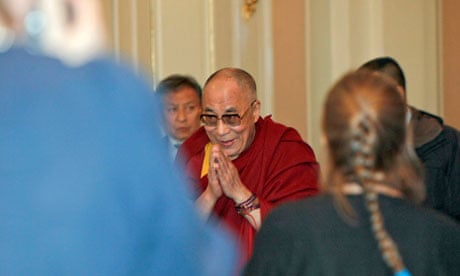A five-day stand-off between monks and armed police at a Tibetan monastery in western China could become "explosive", the Dalai Lama has warned.
The Tibetan spiritual leader also asked the international community to request that Chinese authorities show restraint in the confrontation at Kirti monastery in Sichuan, where police have reportedly locked down the complex with up to 2,500 monks inside.
The International Campaign for Tibet said hundreds of Tibetans gathered at the monastery in Aba county, also known as Ngaba, believing the authorities were preparing to forcibly remove the monks for "patriotic education". Exiles allege that security forces beat residents and loosed dogs on them as they forced their way through the crowds on Tuesday, injuring two women in their sixties.
The re-education campaign was reportedly launched after a young monk from Kirti died after setting fire to himself in protest against Chinese rule on 16 March. English language state media have mentioned the death but have not referred to the clash at the monastery, and the Guardian has not been able to confirm it independently.
A spokeswoman at the Aba local government office said she knew nothing about the situation. But the United States has raised concerns about the confrontation with Beijing.
"I am very concerned that this situation if allowed to go on may become explosive with catastrophic consequences for the Tibetans in Ngaba," the Dalai Lama said late yesterday. "I urge both the monks and the lay Tibetans of the area not to do anything that might be used as a pretext by the local authorities to massively crack down on them.
"I also strongly urge the international community, the governments around the world, and the international non-governmental organisations to persuade the Chinese leadership to exercise restraint in handling this situation."
The Tibetan spiritual leader lives in exile in Dharamsala, India. Beijing accuses him of seeking to split Tibet from the rest of China, while he says he seeks only meaningful autonomy.
The dead monk, Phuntsog, aged between 16 and 20, set fire to himself on 16 March – three years after anti-government unrest rippled across much of Western China following the Lhasa riots. Aba is one of many areas outside the Tibet region with a large Tibetan population.
Tibetan exiles allege that the police beat Phuntsog instead of putting out the flames. Other monks then intervened, dragging him into the monastery for shelter before taking him to a hospital.
A Chinese state media report denied that he had been beaten, saying a post-mortem found no injuries other than burns, and alleged he died because the monks denied him medical treatment.
The International Campaign for Tibet says that authorities then installed a barbed wire fence and concrete wall around much of the huge complex and detained several Tibetans, including a 16-year-old boy and Phuntsog's brother and uncle.
The campaign said residents were allowed to deliver food to the monastery for the first time yesterday and that 15 senior monks spoke to the director of the religious affairs bureau after local religious leaders asked for dialogue.
Sophie Richardson, Asia advocacy director at Human Rights Watch, said: "The use of violence against peaceful, unarmed demonstrators including those surrounding the Kirti monastery would be both unjustifiable and completely unlawful.
"It is vital that Chinese security forces respect the safety of all concerned, use the minimum force needed to keep public order, and fully respect both the monks and bystanders' right to freely practice religion, assemble, and peacefully carry out protests."
A foreign ministry spokesman did not answer questions about the incident at a regular press briefing on Thursday, but said Beijing's policies had dramatically raised Tibetans' living standards.
